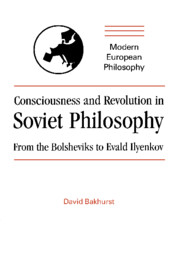Book contents
- Frontmatter
- Contents
- Acknowledgments
- A note on translation, transliteration, and references
- 1 Introduction
- 2 Deborinites, Mechanists, and Bolshevizers
- 3 Vygotsky
- 4 Lenin and the Leninist stage in Soviet philosophy
- 5 Ilyenkov and dialectical method
- 6 The problem of the ideal
- 7 The socially constituted individual: Rethinking thought
- 8 In conclusion
- References
- Index
8 - In conclusion
Published online by Cambridge University Press: 10 December 2009
- Frontmatter
- Contents
- Acknowledgments
- A note on translation, transliteration, and references
- 1 Introduction
- 2 Deborinites, Mechanists, and Bolshevizers
- 3 Vygotsky
- 4 Lenin and the Leninist stage in Soviet philosophy
- 5 Ilyenkov and dialectical method
- 6 The problem of the ideal
- 7 The socially constituted individual: Rethinking thought
- 8 In conclusion
- References
- Index
Summary
Our study of consciousness and revolution in Soviet philosophy began at the very outset of the Soviet philosophical tradition; it proceeded through the controversies of the 1920s and the stagnant orthodoxy of the Stalin era to the contribution of one of the most important of contemporary Soviet philosophers, Evald Ilyenkov. The purpose of this concluding chapter is twofold: First, it briefly considers how the various philosophical themes of this work converge in Ilyenkov's thought. Second, it offers some tentative suggestions about how we should interpret Ilyenkov's life and work in light of the forces unleashed by glasnost' in the USSR today.
In Chapter 5 we saw how Ilyenkov sought to develop and defend a conception of dialectical method drawn from Marx. Ilyenkov, like Akselrod and Vygotsky before him, understands dialectical method as a technique for following the specific nature, or “logic,” of the object of inquiry. Ilyenkov's conception of the individual may be seen as the outcome of his application of this dialectical method to what the Soviet tradition considers the “basic question of philosophy”: the problem of the relation of thinking and being, subject and object.
Ilyenkov's approach to this problem, we may now observe, is strikingly analogous to Vygotsky's attempt to apply Marx's method to the analysis of thought and speech. Ilyenkov treats the subject–object relation as Vygotsky treats the relation between the higher mental functions of thought and speech: as an “internal” relation of mutual determination.
- Type
- Chapter
- Information
- Consciousness and Revolution in Soviet PhilosophyFrom the Bolsheviks to Evald Ilyenkov, pp. 259 - 266Publisher: Cambridge University PressPrint publication year: 1991

